 Petzlover
Petzlover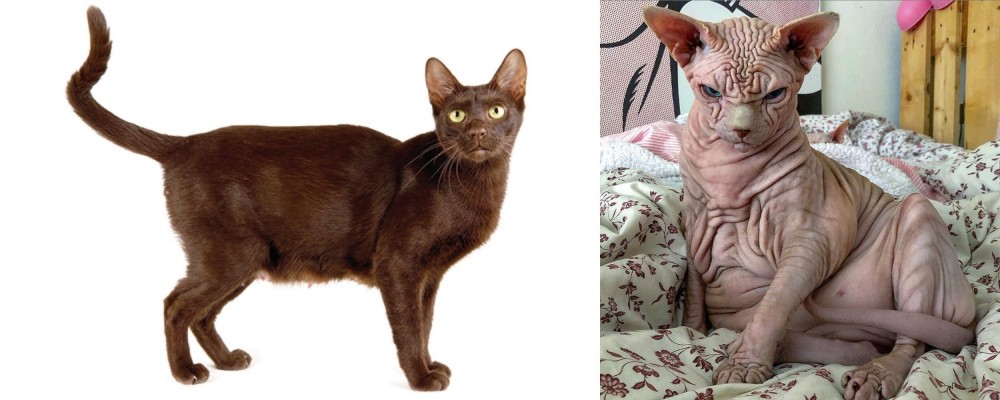 Havana Brown is originated from United Kingdom but Sphynx is originated from Canada. Both Havana Brown and Sphynx are having almost same weight. Both Havana Brown and Sphynx has almost same life span. Both Havana Brown and Sphynx has same litter size. Havana Brown requires Low Maintenance. But Sphynx requires Moderate Maintenance
Havana Brown is originated from United Kingdom but Sphynx is originated from Canada. Both Havana Brown and Sphynx are having almost same weight. Both Havana Brown and Sphynx has almost same life span. Both Havana Brown and Sphynx has same litter size. Havana Brown requires Low Maintenance. But Sphynx requires Moderate Maintenance
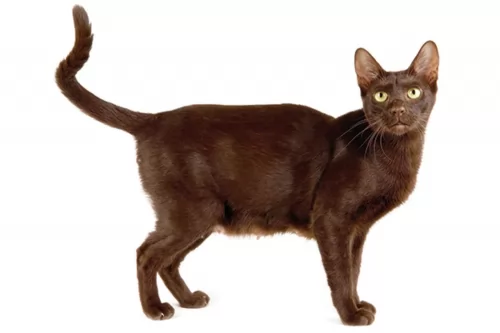 The rare Havana Brown cat seems to be a result of a planned breeding between Siamese and domestic black cats.
The rare Havana Brown cat seems to be a result of a planned breeding between Siamese and domestic black cats.
It was in the 1950s that cat fanciers in the UK became the early breeders. These breeders called themselves the Havana Group. They created the foundation of the modern-day Havana Brown cat.
These breeders managed to produce chocolate shaded kittens which became known as the Chestnut Brown Oriental. Kittens arrived in the US and were crossbred with the Chocolate and Seal Point Siamese to produce chocolate-colored kittens.
In 1964, the Havana Brown was accepted for Championship status by the Cat Fanciers Association.
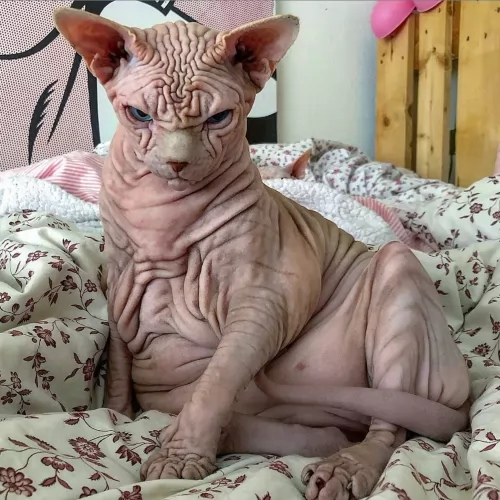 The Sphynx cat is well known for its hairlessness. This breed started its development in Toronto, Canada.
The Sphynx cat is well known for its hairlessness. This breed started its development in Toronto, Canada.
A hairless kitten was born and it was mated to produce more hairless kittens. These kittens were called Canadian Hairless Cats. They were used as the foundation for a new breed.
In the 1970s, more hairless kittens were born and placed into the Sphynx breeding program. They were mated with Devon Rex cats. The International Cat Association recognizes this cat breed.
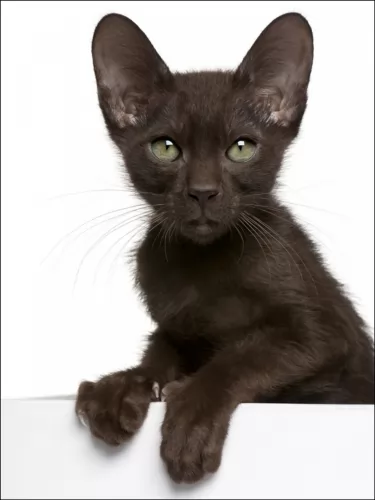 The Havana Brown is a medium-sized cat, being somewhat slender and weighing between 3 and 6kg. The body is long and muscular and the cat has a beautiful brown short to medium-length coat.
The Havana Brown is a medium-sized cat, being somewhat slender and weighing between 3 and 6kg. The body is long and muscular and the cat has a beautiful brown short to medium-length coat.
The coat color is in fact a rich reddish-brown shade. The ears are fairly large and round-shaped and the oval-shaped eyes are a beautiful green.
The Havana Brown is an intelligent, playful, curious cat who enjoys being in the company of its human family. They tend to gravitate towards one favorite family member.
They’re cats that don’t like being left alone for long periods of time. They get on well with children and he also won’t object to becoming friends with the family dog as well.
Friendly though they may be, they also enjoy spending some time on their own. Individual personalities vary but most are playful and talkative.
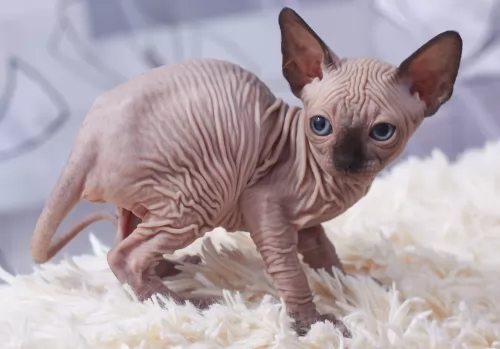 The Sphynx is a medium-sized, fine-boned, muscular cat that weighs roughly between 3.5 – 7 kg. The skin of the cat has a soft chamois type feel to it.
The Sphynx is a medium-sized, fine-boned, muscular cat that weighs roughly between 3.5 – 7 kg. The skin of the cat has a soft chamois type feel to it.
Sometimes there can be a few hairs. The head of this cat is longer and narrower than many of the other cat breeds. The ears are large.
This cat is going to need a bath once a week with special medicated cat shampoo. The cat also has no whiskers or eyelashes. The legs are long and slender and he has a barrel chest. All skin patterns and colors are available with the cat.
The Sphynx is a loving, friendly, energetic, extrovert cat that loves nothing more than to be petted and pampered.
It one of the few dependent cats there are. Even though he is social, he isn’t very vocal. They are playful too and because they are also intelligent, they will need stimulating games and toys to keep them from becoming bored.
They get on well with children in the home. Like many other cats, the Sphynx cat can be doglike and they like to welcome their owners home.
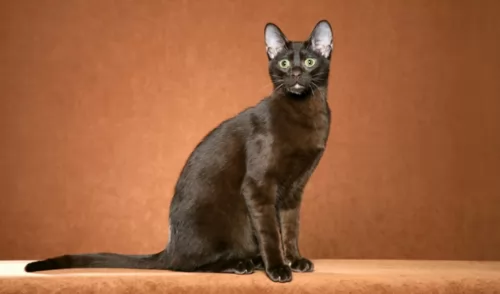 There is a good reason why the Havana Brown cat is so popular. People love the unusually rich brown coat which always has a gleam to it.
There is a good reason why the Havana Brown cat is so popular. People love the unusually rich brown coat which always has a gleam to it.
They also love that this chocolate-colored cat has a wonderful personality and can be a solid companion for humans. So long as you don’t leave him alone for a long time on his own, as that is part of his charm – wanting to be constantly involved with his human family.
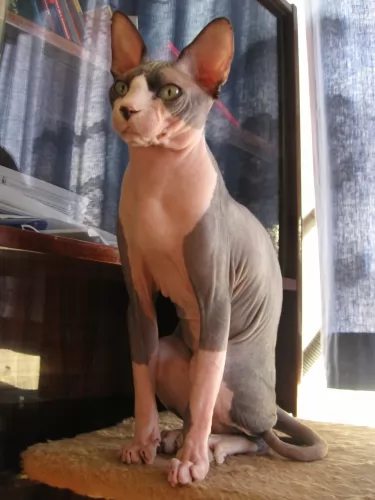 The Sphynx can be in a house where there are children who have been taught to be kind and gentle with animals.
The Sphynx can be in a house where there are children who have been taught to be kind and gentle with animals.
The cat is energetic and loves to entertain and amuse his human family with his antics.
He is loving and loyal to his human family and absolutely hates staying on his own. He can actually get depressed when he is left on his own often.
He would be far better off with another cat companion. If you're looking for a fun, playul, loving and affectionate feline companion, you need look no further than the weird-looking sphynx cat.
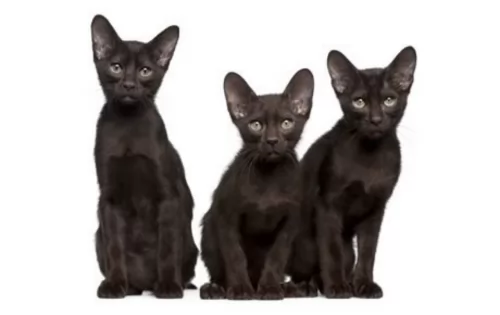 There are no known genetic diseases associated with this breed. They may have a bit of a higher occurrence of gingivitis than other cat breeds, and this thought to come from them having their Siamese ancestry.
There are no known genetic diseases associated with this breed. They may have a bit of a higher occurrence of gingivitis than other cat breeds, and this thought to come from them having their Siamese ancestry.
Beware of bladder stones with your cat which can start at any age. The stones can start off small but can grow larger, rubbing against the bladder walls and resulting in inflammation.
Bladder stones can also lead to blockage of the urethra so that your cat isn’t able to urinate. There are symptoms to indicate your pet may have bladder stones and these can be straining to urinate, painful and little urination, urinary tract infections, and blood in the urine.
This is a time when you want to get your pet to the vet just as soon as possible.
Also, be on the watch for eye infections. Conjunctivitis is one of these to look out for but there are other eye infections your cat can experience. They can come about because of an upper respiratory infection that spreads to the eyes, but they can be caused by any number of things such as bacteria, parasites, and viral infections.
You’ll notice your cat pawing at his eyes and there may even be redness, discharge, and swelling. You vet will be able to treat eye infections with ointments and eye drops.
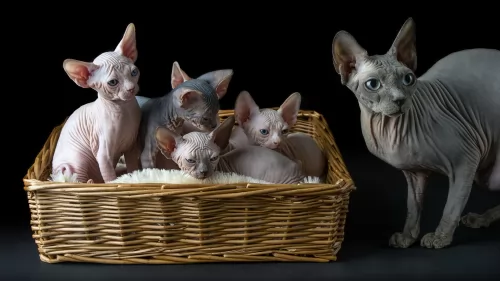 The Canadian Sphynx, just because of its lack of hair, already faces challenges. Other cats have fur to keep them warm and to protect the skin from sunlight.
The Canadian Sphynx, just because of its lack of hair, already faces challenges. Other cats have fur to keep them warm and to protect the skin from sunlight.
In fact, when the kittens are born, without hair, they are vulnerable and become prone to respiratory infections. Reputable breeders, therefore, only allow their kittens to go to new homes when they are at least 14 weeks of age.
This cat is also prone to skin problems and this could include rashes and fungal infections. As with any other cat, the Sphynx cat requires protection from harmful cat diseases by being vaccinated.
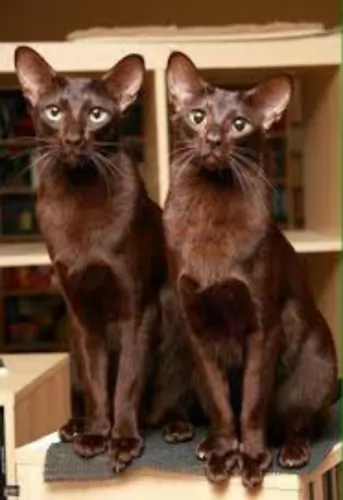 With the cat’s short coat, he experiences little shedding so very little grooming is required. A gentle brush once a week will be enough. These cats love attention and submit easily to a brush and body rub with a soft rubber brush.
With the cat’s short coat, he experiences little shedding so very little grooming is required. A gentle brush once a week will be enough. These cats love attention and submit easily to a brush and body rub with a soft rubber brush.
Check inside the mouth as periodontal disease is a problem with cats. You want to make sure that there aren’t any bad teeth as this can cause a lot of pain.
A vet can also be useful in examining your cat and pinpointing problems.
Check the inside of the ears too because they can become somewhat clogged with wax and dirt. If you don’t want to probe inside the cat’s ears with a cotton ball with warm water and apple cider vinegar, you can take your cat to the vet or to a professional cat groomer.
Keep the litter box of your cat spotlessly clean as these cats are fussy with cleanliness.
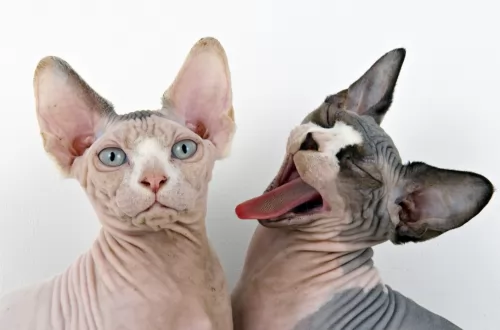 Even though the Sphynx cat is hairless, he isn’t to be regarded as a low maintenance cat. First of all, the sheer lack of hair means he is more vulnerable to the sun and to the cold. If he goes outdoors, you have to be careful that his skin doesn’t get burned.
Even though the Sphynx cat is hairless, he isn’t to be regarded as a low maintenance cat. First of all, the sheer lack of hair means he is more vulnerable to the sun and to the cold. If he goes outdoors, you have to be careful that his skin doesn’t get burned.
These cats also have more ear wax than other cats as they don’t have hair in their ears. Dirt, wax, and oils can accumulate in the ears. They will need to be cleaned regularly, and a vet or the pet groomer can help you with this.
The Sphynx cat also collects oil and dirt under their nails, so just like the ears, the nails as well as the surrounding skin folds will need to be properly cleaned. Cat owners need to know that these hairless cats aren't as low maintenance as thought, but require quite a bit of grooming. Special grooming products are available for this cat.
What one cat likes to eat won’t be the same as another cat. The Sphynx, like every other cat, is a carnivore and he will need all the different nutrients from his food.
The best commercial cat food manufacturers know that the proportion of these nutrients will vary as the cat ages and goes through different stages of its life. Your cat needs the right meat foods and he needs the right quantity as well.